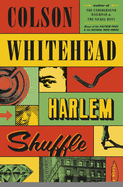
Harlem Shuffle once again shows off Colson Whitehead's ability to master myriad genres, this time with his first crime novel, the eagerly awaited follow-up to his Pulitzer Prize-winning novels The Underground Railroad and The Nickel Boys. After delving into zombie fiction (Zone One) and even a nonfiction book about poker (The Noble Hustle), Whitehead confidently crafts a pressure-cooker novel about a used furniture dealer sliding into criminality in tumultuous early-1960s Harlem. Ray Carney is trying to escape the shadow of his father, a long-time crook, by establishing himself as a legitimate businessman, while sometimes dabbling in dubiously acquired merchandise. But it's his association with his cousin Freddie that threatens to drag Ray into real trouble again and again, as Freddie's harebrained criminal schemes inevitably go sideways.
Harlem Shuffle makes excellent use of time-honored techniques, piling problem upon problem onto Ray's shoulders. It also benefits from a lived-in sense of place, depicting a Harlem "after the neighborhood tipped over from Jews and Italians and became the domain of Southern blacks and West Indians. Everyone who came uptown had crossed some variety of violent ocean." The neighborhood is far from exempt from civil rights-era battles, though Whitehead's hard-bitten characters tend to view these struggles with a pragmatic, even cynical eye.
As the novel's events come to a head, Ray comes to realize what grabbing a piece of the American dream will cost in a country rigged against him, and has to decide whether he can pay it. For readers, Ray's constant balancing over the abyss makes for a gripping story, as lovingly detailed as it is good pulpy fun. --Hank Stephenson, the Sun magazine, manuscript reader

